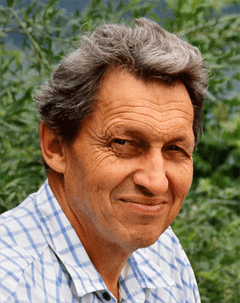Anatoly Larkin
| Anatoly Larkin | |
|---|---|
 | |
| Born |
October 14, 1932 Kolomna, Russia |
| Died |
August 4, 2005 (aged 72) Aspen, Colorado |
| Residence | Russia, U.S. |
| Nationality |
Russian (1932–2005) American (2003–2005) |
| Fields | Physics |
| Institutions |
Kurchatov Institute of Atomic Energy in Moscow L.D.Landau Institute for Theoretical Physics University of Minnesota, Minneapolis |
| Alma mater | Moscow Institute for Physical Engineering |
| Doctoral advisor | Arkady Beynusovich Migdal |
Anatoly Ivanovich Larkin (Russian: Анатолий Иванович Ларкин; October 14, 1932 – August 4, 2005) was a Russian theoretical physicist, universally recognised as a leader in theory of condensed matter, and who was also a celebrated teacher of several generations of theorists.[1]
Born in a small town of Kolomna in Moscow region, Larkin went on to receive his education at the Moscow Engineering Physics Institute. He worked on his PhD on the properties of plasmas under the supervision of A.B.Migdal and later received the degree of Doctor of Science (1965) for studies of superconductivity.
Research at the I.V. Kurchatov Institute in Moscow (1957–66) was followed by nearly 40 years of work at the L.D.Landau Institute for Theoretical Physics in Chernogolovka, Moscow region, where he moved in 1966. During 1970–1991, he was also a Professor of Moscow State University. Since 1995, Larkin was a Professor of Physics at the University of Minnesota and a member of William I. Fine Theoretical Physics Institute.[2]
The list of his publications (233 entries) consists of papers on condensed matter theory, theory of elementary particles, and nuclei and plasmas.[3] Citation index of publications by A. Larkin exceeds 14,000.
The dominant part of his work is devoted to superconductivity, magnetism, ferro-electricity, properties of metals, semiconductors and dielectrics. He pioneered the concept of spontaneous symmetry breaking in the physics of elementary particles,[4] discovered collective pinning of magnetic flux in superconductors,[5] predicted paraconductivity[6] and effects of fluctuations on properties of superconductors,[7] made essential contributions to the theory of weak localization,[8] as well as developed the concept of the Ehrenfest time[9] and its effect on phenomena of quantum chaos.
A.I. Larkin was the famous teacher of a large number of actively working theorists. His students and collaborators are teaching and conducting research in Russia, USA, Great Britain, France, Italy, Germany, Switzerland, Israel and other countries.
He died suddenly at 6pm on August 4, 2005 in Aspen, Colorado, where he was attending a physics workshop.
Honors and Prizes
- Bardeen Prize(2004)
- Lars Onsager Prize (2002)[10]
- Award of Excellence of the World Congress on Superconductivity(1994)
- Hewlett Packard Europhysics Prize(1993)[10]
- Alexander von Humboldt Medal (1993)
- Member of Russian Academy of Sciences(1991).[11]
- London Prize in Low Temperature Physics(1990)
Selected publications
- A. Larkin, A. Varlamov, Theory of fluctuations in superconductors, Oxford University Press, 2005, xviii, 412 pp. ISBN 0-19-852815-9 [International Series of Monographs on Physics 127]
- I.L. Aleiner, A.I. Larkin, Role of divergence of classical trajectories in quantum chaos, Phys. Rev. E 55 (2), R1243-R1246 (1997)
- A.L. Larkin, Yu.N. Ovchinnikov, Quantum tunneling with dissipation, JETP Lett., 37 (7), 382-385 (1983) ; Pis’ma v ZhETF, 37 (7), 322-325 (1983)
- S. Hikami, A.I. Larkin, Y. Nagaoka, Spin-Orbit Interaction and Magnetoresistance in the Two Dimensional Random System, Prog. Theor. Phys., 63(2), 707-710 (1980)
- A.I. Larkin, Effect of inhomogeneities on the structure of the mixed state of superconductors, Sov. Phys. JETP 31(4), 784 (1970) ; (RUS) ZhETF, 58 (4), 1466-1470 (1970)
- A.I. Larkin, D.E. Khmel’nitskii, Phase Transition in Uniaxial Ferroelectrics, Sov. Phys. JETP 29(6), 1123-1128 (1969) ; (RUS) ZhETF, 56 (6), 2087-2098 (1969)
- L.G. Aslamazov, A.I. Larkin, Effect of Fluctuations on the Properties of a Superconductor Above the Critical Temperature, Sov. Phys. Solid State, 10(4), 875-880 (1968) ; (RUS) Fizika tverd. tela, 10 (4), 1104-1111 (1968)
- A.I. Larkin, Yu.N. Ovchinnikov, Nonuniform state of superconductors, Sov. Phys. JETP 20, 762 (1965) ; (RUS) ZhETF, 47(3), 1136-1146 (1964)
- V.G. Vaks, A.I. Larkin, On the application of the methods of superconductivity theory to the problem of the masses of elementary particles, Sov. Phys. JETP 13, 192-193 (1961) ; (RUS) ZhETF, 40(1), 282-285 (1961)
- A.A. Vedenov, A.I. Larkin, Equation of state of plasma, Sov. Phys. JETP 9, 806-821 (1959) ; (RUS) ZhETF, 36(4), 1133-1142 (1959)
Notes
- ↑ Anatoly Larkin, world-renowned physicist, dies: News Releases: UMNnews: U of M
- ↑ William I. Fine Institute Homepage
- ↑ A.A. Vedenov, A.I. Larkin, Equation of state of plasma, Sov. Phys. JETP 9, 806-821 (1959)
- ↑ V.G. Vaks, A.I. Larkin, On the application of the methods of superconductivity theory to the problem of the masses of elementary particles, Sov. Phys. JETP 13, 192-193 (1961)
- ↑ A.I. Larkin, Effect of inhomogeneities on the structure of the mixed state of superconductors, Sov. Phys. JETP 31(4), 784 (1970)
- ↑ L.G. Aslamazov, A.I. Larkin, Effect of Fluctuations on the Properties of a Superconductor Above the Critical Temperature, Sov. Phys. Solid State, 10(4), 875-880 (1968)
- ↑ A. Larkin, A. Varlamov, Theory of fluctuations in superconductors, Oxford University Press, 2005, xviii, 412 pp. ISBN 0-19-852815-9 [International Series of Monographs on Physics 127]
- ↑ S. Hikami, A.I. Larkin, Y. Nagaoka, Spin-Orbit Interaction and Magnetoresistance in the Two Dimensional Random System, Prog. Theor. Phys., 63(2), 707-710 (1980)
- ↑ I.L. Aleiner, A.I. Larkin, Role of divergence of classical trajectories in quantum chaos, Phys. Rev. E 55 (2), R1243-R1246 (1997)
- ↑ 10.0 10.1 Efetov, Konstantin B.; Khmelnitskii, David E.; Ovchinnikov, Yuri N.; Wiegmann, Paul B. (April 2006). "Obituary: Anatoly Ivanovich Larkin". Physics Today 59 (4): 88–89. Bibcode:2006PhT....59d..88E. doi:10.1063/1.2207057.
- ↑ Ларкин Анатолий Иванович (in Russian). Russian Academy of Sciences. Retrieved 25 March 2012.
External links
|